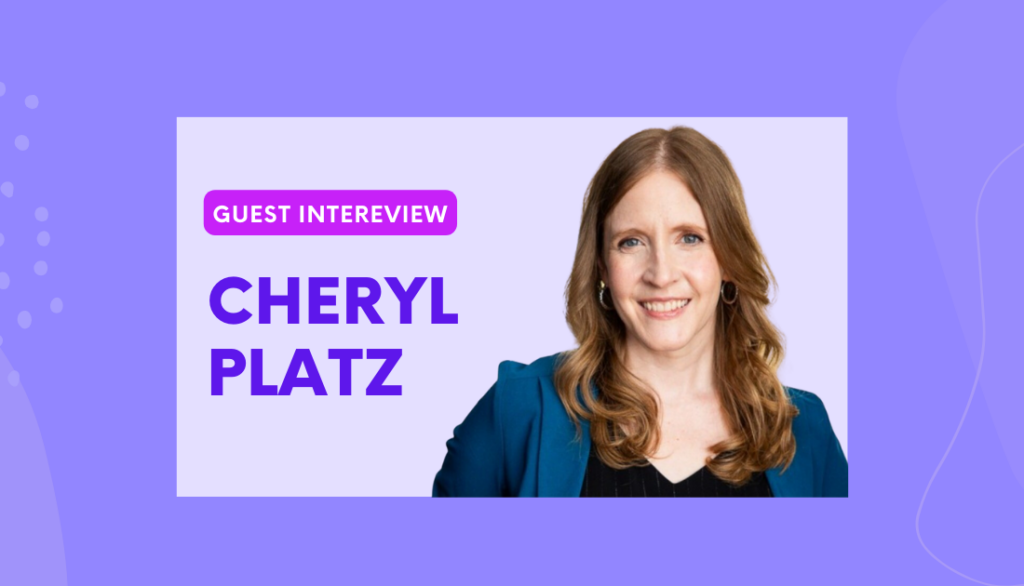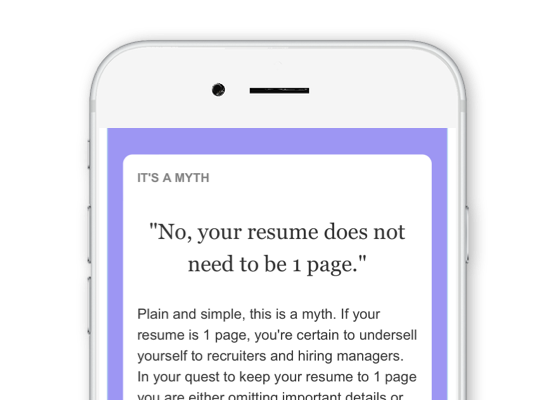Episode 67
You got the offer! How to decide whether you should accept a job offer and what to do if it’s not
9 min listen
Episode 12
9 min listen

Listen to the Episode
Episode Summary
You’ve finally received a job offer! But before you jump in headfirst, you need to figure out how to decide whether you should accept the job offer or not and if it’s right for you. In this episode, we dive into the factors beyond salary and job title that can make or break your job satisfaction. Sarah Doody, CEO of Career Strategy Lab, walks you through three key considerations and signs you should take a job offer or not: future career goals, alignment with your values and deal breakers, and day-to-day work dynamics.
This episode offers practical advice on evaluating whether the role will set you up for success in your desired career trajectory, whether the company’s mission aligns with your values, and if the work environment suits your lifestyle. Furthermore, if you realize the job isn’t the right fit, you’ll learn how to decline the job offer gracefully. Remember, it’s perfectly okay to prioritize your own happiness and growth when it comes to accepting a job offer. So grab a pen and paper, take some notes, and learn how to make informed decisions about accepting a job offer now or in the future. Don’t miss out on this valuable insight that could save you from future career regrets.
Create your dream career, and life
- Book a free Career Strategy Call to learn how we can help you
- Get our free Career Roadmap to help you navigate your career
- Check out Career Strategy Lab, our 3-month career coaching program
Discussion Questions About The Episode
- How often do you find yourself solely focused on the salary or job title when considering a job offer? How might this narrow focus prevent you from evaluating the overall fit for your career goals and personal values?
- Think about your current or previous job experiences. Have there been times when you realized a job wasn't the right fit for you after accepting an offer? What were the specific factors that made you realize the job offer wasn't suitable? How could you have identified these red flags earlier in the decision-making process?
- Reflect on your short and long-term career goals. How does the job you're currently considering or the job you're currently in align with those goals? Are there any skills or experiences you need to acquire through your next job in order to progress towards your long-term aspirations?
- Consider the impact of values and deal breakers in your job choices. What are the values that are most important to you in a workplace environment? How have these values shaped your past job decisions? Have there been instances where compromising these values led to dissatisfaction in your job? How can you ensure that your next job aligns more closely with your values?
Episode Transcript
Sarah Doody [00:00:00]: You got the offer. Here is how to determine if the job is a right fit. Although a job offer is an exciting accomplishment, I don’t want your judgment to be clouded by the salary or other shiny objects. The truth is even if you get an offer, sometimes it might not be right for you, and that’s what we’ll talk about today. I’m Sarah Doody, founder and CEO of Career Strategy Lab, the career incubator for UX product and tech professionals who are determined to grow their careers in the field of UX and product development. I’ve heard it time and time again. I don’t like my job, but I’ve heard if I leave before a year, it will look bad. My goal for you today is that you learn how to decide a job is right for you or not so you can reduce the risk that you accept a job and then realize a few weeks or months later that it’s actually not right for you.
Sarah Doody [00:01:04]: The reason so many job seekers end up in this position is because they get so focused on the salary, job title, or a company they wanna work at, and spend little to no time at all thinking about everything else that impacts whether a job is right for you and if it’ll be fulfilling, rewarding, and a fit for your life. For example, many people who work in tech are obsessed with working at a FAANG company. FAANG is short for Facebook, Apple, Amazon, Netflix, Google. Anyway, they’re obsessed with working at these FAANG companies because they think it will give them clout for years years to come. And for those who do get hired at one of these big companies, it’s sometimes a rude awakening when their expectations don’t meet reality in terms of culture, team size, opportunities for growth, or other important criteria. There are 3 things to consider. So grab a piece of paper, pause this if you need to, but you’re gonna wanna write these down. Number 1, does it set you up for the role you want after this one? You really need to consider your short and long term career goals, skills, experience.
Sarah Doody [00:02:26]: For example, if you wanna be in a managerial role, say, I don’t know, 5 years from now, and you don’t yet have any management experience, then you need this next job to give you a chance to get some management experience. And a lot of people only focus on the next job and don’t think about their longer term career goals. Okay. 2, does the job align with your values and deal breakers? So, obviously, beyond things like salary, benefits, and job title, you wanna be asking yourself, does this job give you what you need? Do you have a sense of what you need in a team or a manager? Does this role seem like it would give that to you? Does the company’s mission align with your values and interests, or would it maybe feel like a compromise of values to you, are you perhaps the type of person who really takes professional development seriously and leverages things like company learning and conference budgets, well, if the company doesn’t offer this, then maybe the role isn’t a fit. Think about things like this to help you decide if the role is right for you. 3, what would my day to day look like? Does that work for my lifestyle. Now I want you to think about your schedule, commute, working environment, etcetera. What do you need to help you feel productive and like you can perform at your best? Does the company’s remote work policy align with your lifestyle goals.
Sarah Doody [00:04:07]: If the role is in person and the office is open concept, but you know that’s hard for you, then maybe you can try and negotiate a hybrid in person and remote setup. It’s so easy to get excited when you have a job offer, when you see the salary and it’s easy to forget to consider everything else that goes into a job and how that impacts your life and future career aspirations. Considering these 3 things will help you make a more intentional decision about accepting the role or not. What to do if it’s not right though? So if you know the role is not right, then let someone know and do this sooner than later. Keep it brief, and don’t feel compelled to give sense of reasons about why you no longer wanna proceed with the interviews or the offer. Depending on your rapport with your main contact at the company for the role, you might choose to provide some additional context, but it’s completely not necessary. A simple note to the effect of I’ve decided to pursue other opportunities is completely fine. And never, and I wanna emphasize this, never ever ever feel guilty about declining a job offer or removing yourself from the interview process.
Sarah Doody [00:05:29]: You know, let’s face it. When companies need to make hard decisions such as layoffs, they don’t feel guilty, and they say it’s just business oftentimes. The same applies to you declining a job offer. Even if you’ve made it to the final round and they flew you across the country, don’t feel bad about passing if it’s not right for you. Whether you accept the job or not, receiving a job offer should boost your confidence and signal that together, your resume, your LinkedIn, and your interview skills did a great job at communicating your skills and experience. So take time to reflect on your job search and interview process that got you to this point, and I want you to write down anything you think that went well or that you do differently next time. This is really your chance to hit pause, to learn and grow as a professional through this job search and offer. But if you don’t write it down, you will most likely forget when the next time comes around for job interviews or a job search.
Sarah Doody [00:06:40]: Alright. I know today’s episode was so packed. So let’s do a really quick recap. We talked about why it’s important to think beyond salary, and evaluate your values, deal breakers, and how the role would set you up for future roles. I shared strategies for what to do if a job offer is not right and how you could decline that job offer. And lastly, the importance of reflecting on the experience so you can note any lessons learned that you can use in future job searches or interviews. So I want you to write these 3 questions down right now so you can use them next time or give them to a friend who might be deciding about a job offer right now. Question 1, does the job set you up for the role you want after this one? Question 2, does the job align with your values and deal breakers? Question 3, what would your day to day look like? And does that work for your lifestyle? Alright, friends.
Sarah Doody [00:07:45]: That is all for today. Friendly reminder that I created a season 1 podcast workbook it includes all the reflection questions I share in each episode so you can work your way through them and not have to worry about taking tons of notes while listening to the episodes. Head to careerstrategylab.com/workbook to grab your copy now. I am Sarah Doody, founder and CEO of Career Strategy Lab. And I hope that today’s tips help you out with your current or future job search or deciding if a job offer is right for you. If you’ve found this content helpful, I would truly appreciate it if you would leave a review, a comment, give the like button a click, or share this with someone that you think would find a lot of value in it. You are always welcome to learn more about Career Strategy Lab at careerstrategylab.com. And don’t forget to check out all my other resources about the UX job search and everything that that entails on my YouTube, which is Sarah Doody, my Twitter, also, Sarah Doody, my Instagram, which is Sarah Doody UX, or you can search me by my name, Sarah Doody, on LinkedIn.
Sarah Doody [00:09:02]: I hope you have a wonderful rest of your day, and I will see you next time.













